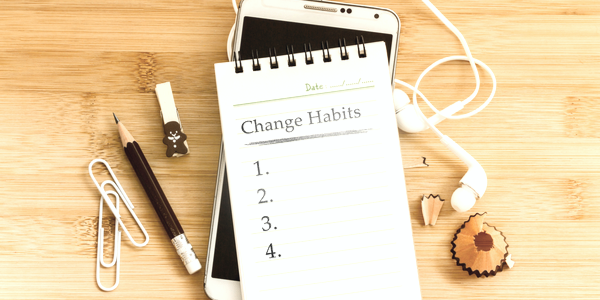
Humans are creatures of habit, but they do not have to be creatures of bad habits. When it comes to making healthy lifestyle changes, one may first need to learn how to break a habit that is not working towards wellness.
Balance and abundant good health come when a bad habit is replaced with a better one. Read on for a list of bad habits examples and for inspiration on good habits to start as soon as today.
List of Bad Habits
Ever heard the phrase, "Too much of a good thing isn't good anymore"? Many modern-day bad habits approach addiction and have the power to negatively influence health.
Finding productive ways to practice moderation can be a key step to breaking the following common bad habits.
Addictive Behaviors
• Cell phones: Cell phones have become so efficient that they are essentially computers in our pockets. There is an app for just about everything these days, and while some provide convenient tools, others steal attention. Cell phones go from convenient to counter-productive when hours a day are idled away. This especially serves true when a healthy and active lifestyle can be managed with less than one hour of exercise daily.
• Multi-tasking: Studies have shown that increased depression and anxiety can result from overworking oneself. As sisters Emily Nagoski Ph.D. and Amelia Nagoski D.M.A. say in their book Burnout, perfectionists become "exhausted by everything they have to do, yet are still worried they [aren’t] doing 'enough'...we have been lied to our whole lives about what wellness "should’ look like'."
Activities Promoting Inactivity
• Social media: Social media became a bad habit before studies were able to connect it to the rising rates of obesity. While social media may not be a silent killer, it can play a significant role in rising public health epidemics.
• Dependence on technology: Thin lines separate convenience and dependence. Slothful behavior, oversleeping, inactivity, and other behaviors can quickly produce dangerous patterns. In fact, sleeping disorders and chronic disease risk increase when sleep and inactivity become excessive.
Eating Habits that Affect Health
• Excess: Saturated fats, sodium, processed meat, and added sugars are consumed in high amounts as part of the modern diet. This can lead to high calories and no real nourishment for the mind and body. Over time, bad eating behaviors can increase the risk of chronic diseases such as diabetes, heart disease, and stroke.
• Sugar-sweetened beverages: Many people choose to drink their calories despite science continuing to show that the risk of death can increase when following these patterns. Bad habits can build up, but healthy dietary habits can also improve wellness within weeks or months. It is all about acting on knowledge and remaining aware of healthier drink choices such as water, the gold standard for hydration.
Small shifts add up over time, for better or for worse. Fortunately, good habits can gradually replace unhealthy choices.
10 Tips On How to Break Habits
Historically, there have been two camps when it comes to approaching habits. Some researchers believed that habits are the body's form of automating tasks, similar to how a computer approaches routine or daily actions when automated.
The other side of science believed that habit involves more mindful actions. Fortunately, today most studies take a mind-body approach and acknowledge that while the body craves logical patterns, it also is highly adaptable. It is often said that old habits die hard, but choosing to change can make altering stubborn habits easier.
True, lasting change requires commitment, time, and effort, but is worth the energy and other resources gained. Here are 10 tips on how to break habits:
1. Prioritize
A surprising number of bad habits can be broken through the catalyst of putting pen to paper. Listing priorities, and especially physically writing them down, forces the mind to focus on core beliefs and values. Change soon follows as one learns to align actions and behavior with what they truly believe.
For example, do not throw the cell phone away. Instead, most phones are enabled with time limits on apps. This allows for phone calls and messages to come through but also allows a block for when less productive apps distract.
2. Set Boundaries
Boundaries are essential to breaking bad habits. For example, responding to work emails at all hours of the night can cause burnout. Limiting work to certain hours of the day allows for productive rest and intentional time to invest with loved ones.
3. See Stages of Change
People can get frustrated easily if they are viewing change as an instant or overnight process. Bad habits develop gradually, and so do new and healthier habits.
Understanding that health behaviors follow four main stages (contemplation, preparation, action, and maintenance) can help people see change on a spectrum and celebrate meaningful progress towards better health.
4. List Pros and Cons
When it comes to habits like healthy eating and physical activity, it can help to list pros and cons. It is easier to see the negative effects of poor habits when they are listed out. Pros can draw attention to the abundance of health available if an individual invests in making a change.
5. Identify Roadblocks
It is easy to give up at the first sign of trouble. Yet, the more fulfilling route is to see the roadblock and identify alternate options.
For example, instead of abandoning the healthy habit of exercise on a day that it seems unlikely, try to think of less traditional methods of movement. This may include gardening, dancing, walking the dog, or hiking.
6. Educate
Sometimes bad habits are simply a result of a lack of education. Small increases in awareness can yield big results for health.
For instance, learning about food portions or asking for reference lists from a dietitian can make healthy eating more achievable.
7. Track Triggers and Praise Progress
Milestones are worth celebrating! Keeping track of goals can help when identifying setbacks and also when meeting checkpoints along the way.
It can also be helpful to identify unhealthy patterns and triggers so that goals can be adjusted to become more realistic.
8. Advocate for Accountability
Whether through an app, cell phone, virtual assistant, coworker, or friend, accountability partners can make a difference. Having a family member checking in or offering support can provide much-needed motivation.
Plus, the buddy system can make breaking bad habits that much more fun. It can also increase the likelihood of sticking to it in the future.
9. Make the Easy Choice a Healthy One
Creating a list full of healthy options or alternative hobbies and activities can make healthy choices easier. A healthier future is more achievable when health is made easier today. Be patient with slow progress, and reward yourself without demanding perfection.
10. Nourish a Healthy Mindset
Self-made billionaire and founder of Spanx Sara Blakely said, "My dad encouraged us to fail growing up. He would ask us what we failed at that week. ... It changed my mindset at an early age that failure is not the outcome--failure is not trying. Don't be afraid to fail."
Healthy habits result when failures are viewed as learning opportunities and not as endpoints in the journey. Try to outsmart obstacles instead of being overtaken by them.
Good Habits to Start
Most people underestimate the power of bad habits. They do not realize what they have sacrificed until it is too late.
Instead of waiting until change is the only option, be proactive about living a healthy lifestyle today.
Add a Range of Activities for a Change
Healthy habits do not have to be routine. Variety can help to bust boredom and encourage an innovative attitude about good behavior.
Trying something new or creating a change of scenery can even encourage curious friends and family members to join in on the journey to better health.
Have a Solution for Setbacks
Some setbacks are bound to occur on the road to healthier living. Instead of being discouraged, develop a game plan for when things go wrong.
For example, having a go-to healthy eating plan when dining out can make eating on the road easier.
Challenge Yourself
Comparison is a dangerous game to play, especially when it comes to healthy habits. In the age of social media, false messages are portrayed about what wellness looks like.
Instead of competing with someone else's highlight reel, challenge yourself to be the best version of you!
Fuel Change with Healthy Food Choices
Feeling well starts with eating well. An eating plan that includes whole foods like vegetables, fruits, whole grains, lean protein, and nutrient-rich dairy products can help improve overall health.
Need some inspiration to get started? The Academy of Nutrition and Dietetics recommends the following:
• Eat breakfast
• Cut back on caffeine
• Pack lunch for work instead of eating out every day
• Eat more fruits and vegetables
• Cook dinner at home
• Compile quick tips for healthy eating
Make the Most of the Time You Have
No one has all the time in the world, but everyone has a say in how they choose to spend it. Think through the available options and make an educated choice based on realistic goals. Ask for help when it is needed, and begin again at any time.
The Bottom Line
Overall, be patient with the process and start small with replacing bad habits. This may mean simply making at least three meals at home for dinner rather than relying on fast food.
With time and consistency, you will break free from negative habits. Over time, good habits form and will lead to long-term physical and mental health benefits.
References:
Johnson A. Sticking with It! Maintaining Healthy Lifestyle Changes. Eat Right. Published January 24, 2019. https://www.eatright.org/health/weight-loss/your-health-and-your-weight/sticking-with-it-maintaining-healthy-lifestyle-changes.
National Institute for Diabetes and Digestive and Kidney Diseases (NIDDK). Changing Your Habits for Better Health. NIH NIDDK. Published November 2020. https://www.niddk.nih.gov/health-information/diet-nutrition/changing-habits-better-health.
Ramírez-Vizcaya S, Froese T. The Enactive Approach to Habits: New Concepts for the Cognitive Science of Bad Habits and Addiction. Front Psychol. 2019;10:301. Doi: 10.3389/fpsyg.2019.00301.
Wein H. Creating Healthy Habits (Make Better Choices Easier). NIH News in Health. Published March 2018. https://newsinhealth.nih.gov/2018/03/creating-healthy-habits.
Wein H. How Your Eating Habits Affect Your Health. NIH News in Health. Published May 2017. https://newsinhealth.nih.gov/2017/05/how-your-eating-habits-affect-your-health.







